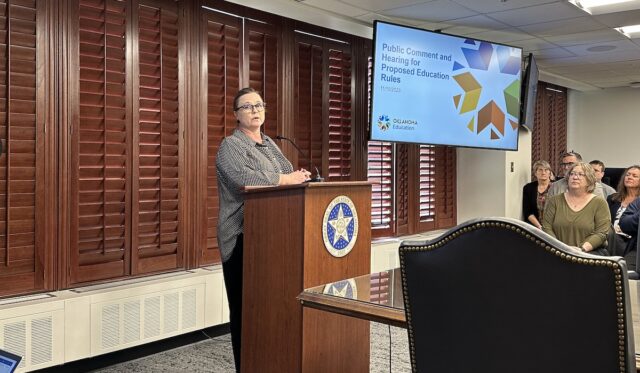

Two weeks after a contentious public comment hearing at the Oklahoma State Department of Education over proposed accreditation standard changes for alternative education, a requirement that students attend in-person classes has been removed from the new rules set to be voted on this week.
With the State Board of Education set to meet at 9:30 a.m. Thursday, the change in the rule proposal was hailed as a victory by leaders of an online alternative school that serves about 1,100 Oklahoma students.
“Parents deserve the right to choose the best learning environment for their child, and the revisions to the proposed rules protect their rights,” Jennifer Wilkinson, director of the Insight School of Oklahoma virtual charter school, said in a statement today. “Insight School of Oklahoma appreciates all our students, families, staff and other school choice advocates who spoke out against the original proposed rules.”
At a Nov. 15 public hearing, many parents and teachers from Wilkinson’s school shared their stories of virtual education. Were the alternative education standards changed to require students to attend in person, ISOK’s education model would effectively end.
“We appreciate the Department of Education and State Board of Education for listening to these voices, protecting our school, and ensuring public virtual schools can continue to serve students as alternative education programs,” Wilkinson said. “Now we can return our focus to our top priority — providing quality education to our students and families.”
One of the parents who spoke out Nov. 15 was Erika Penuel, who also teaches at ISOK, which serves teen parents, students recovering from addiction and young people with other life experiences that have affected their education.
For years before he began attending the ISOK, Penuel’s son came home from his traditional public school covered in bruises given to him by “bullies.”
“Because of [his] anxiety surrounding being bullied, the idea of attending a brick-and-mortar school is frightening,” Penuel said. “I’m here to represent those of my current students who have babies. They want so badly to graduate, but in their small town there’s no daycares that they can get to easily. Even in the larger towns and cities daycare is out of reach for these kids.”
Like many others who spoke Nov. 15, Penuel cried for much of her allotted three minutes.
Another parent of an ISOK student said her son almost attempted suicide before he began attending the online alternative school.
“If I did not seek help with him as soon as I did with ISOK, he would not be here today,” the parent said. “With ISOK, he was able to take three to four classes a day and able to thrive.”
Two other parents said their respective kids were bullied by other students — and sometimes teachers — before they switched to ISOK.
Those parents and 24 other administrators, teachers, supporters and a student shared their stories throughout the 90-minute public comment hearing on the potential rule change.
ISOK supporters had found themselves at the center of a philosophical dispute regarding school choice that seemed disingenuous to some who were familiar with State Superintendent of Public Instruction Ryan Walters’ overarching political positions.
“These proposed changes limit school choice and strip away power from parents,” Wilkinson said during the hearing.
In the rule impact statement released with the original version of the proposed changes, OSDE had implied the changes would bring Oklahoma’s standards for alternative education in line with “best practices.”
“The purpose of this rule is to update the alternative education rules in order to improve the quality of alternative education, comply with best practices for alternative education,” OSDE’s statement claimed.
But some national groups seem to disagree with the idea that best practices for alternative education must include in-person learning. For example, the National Alternative Education Association’s list of best practices includes provisions for virtual alternative education.
‘Relevant provisions are not in the final version’
One day before the State Board of Education meeting, OSDE released the accreditation standards changes it will ask members to approve Thursday. While the changes discussed at the hearing Nov. 15 featured requirements for in-person learning for alternative education students, those requirements did not make it to the final version of the potential new accreditation standards.
OSDE’s summary of the public comment hearing that will be presented to board members Thursday lists a response to many of the complaints voiced by ISOK supporters.
“The relevant provisions are not in the final version of the rules,” the summary states.
State Board of Education members are still set to vote on other changes to the alternative education accreditation standards, including requirements that students regularly meet with a counselor and that they receive an “at risk” assessment as needed.
In an interview days before the Nov. 15 public comment hearing, Penuel insisted that even if the changes requiring in-person instruction were approved, ISOK would continue to operate, albeit with significant changes.
“We are not closing,” Penuel said. “That is one thing that needs to be abundantly clear. But we are an alternative school, and we would cease to be allowed to be an alternative school.”
State Board of Education members are also expected to review other changes to administrative rules that would give schools’ academic performance more weight when their accreditation status is being considered.
The full agenda for Thursday’s State Board of Education meeting can be reviewed here. Other agenda items include a presentation about Tulsa Public Schools and a proposed legal contract regarding St. Isidore of Seville Catholic Virtual School litigation.
(Correction: This article was updated at 3:25 p.m. Wednesday, Nov. 29, to reflect that the State Board of Education is scheduled to review administrative rules regarding academic outcomes and school accreditation status.)




















